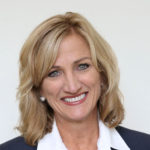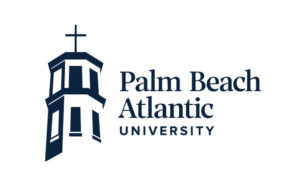
These are exciting times at Palm Beach Atlantic University, as we review architects’ plans for the Marshall and Vera Lea Rinker Business Building. Our excitement rises even higher when we consider how the new building will allow us to expand impactful business programs and courses taught by engaging professors such as Barbara VanderWerf.
“Professor VanderWerf is one of my favorites,” said finance major Emily Kintz. “I just really love her teaching style. She’s very focused on making connections with each student individually.”
Emily, a senior, had enjoyed several courses under Barbara, who is assistant professor of management. Now, in her final PBA semester, Emily is taking Barbara’s very popular business elective Financial Literacy. “Obviously, in my major, we’ve learned a lot about finance on the business level,” said Emily. “But I was eager to learn more about my personal finances and what to do with those after graduation.”
It’s not an exaggeration to imagine this Financial Literacy course will prove life-changing for some of the 200 students who have taken it since Barbara developed the course in 2021. “I know you can do a balance sheet,” she tells students, “but can you be the CFO of your life, not just your business?”
At the heart of becoming “CFO of your life” is developing what Barbara calls a PFP, a personal financial plan. And this truly gets personal, beginning in the first module of the course. “Students create goals the first day,” she said, “identifying some dreams for their life and writing a few paragraphs about why and how they’re going to commit to this.”
Professor learned some lessons the hard way

The concept is a personal passion for Barbara, who recalls a point in her life “where I had to just really get a grip on my finances.” She learned a lot, including lessons learned the hard way. “It’s my hope for students that they will learn from personalizing the information I give them and not from hindsight.”
In each of the 10 modules of the course, Barbara has students add details to their personal financial plans, based on specific topics covered in that module. Consider the following samples of her approach.
∙ Financial goals, said Barbara, must be specific and measurable, and linked to processes and a prioritized action plan. “A goal without a plan is just a wish.”
∙ Debt payments: “Some people have the mindset ‘What’s the payment I can afford?’ But it’s not about the payment,” she said. “It’s really about whether you can afford that car or that other particular item.”
∙ Credit cards: Barbara encourages students to avoid credit cards, but she acknowledges that in today’s environment building good credit history may be necessary in order to rent a car or an apartment. The secret, she said, is to pay off the entire monthly balance of the credit card either before or when it is due, “not paying one dime of interest.” The day you can’t pay off the card “is the day you put that card away.” That’s a critical discipline, she said, because financial management is “80 percent behavior and only 20 percent knowledge.”
∙ The biblical perspective: “There are more than 2,000 verses in the Bible about money and finances,” said Barbara. “That tells us that how you handle money is pretty important to God.” Barbara’s final module in the course explains generous giving and philanthropy.
On track toward freedom from financial stress

Other topics in the course include market and investment fundamentals, mortgage fundamentals, decision-making regarding insurance and the essentials of retirement planning. I’m convinced that students who diligently learn and use the tools provided in this course will leave PBA on the right track toward debt-free living, freedom from financial stress and honoring God with their resources.
Senior Emily Kintz soon will be heading for the University of Florida to earn her Master’s in Health Administration. (Instead of an MBA, she’s going for an MHA, learning the business side of healthcare.) I wouldn’t be surprised to hear one day that Emily is managing or owning a medical practice of some sort.
Other veterans of Barbara’s course will be a step ahead toward becoming dependable financial leaders in their fields and in their homes. And in the years to come, many others can learn much from the course, even if they don’t earn a PBA degree. We plan to open the Financial Literacy course to the local community and more broadly across Florida. We’ll also make available financial coaching, seminars and workshops. In an era when so many in our society are over-burdened with debt and financial worries, it will be our privilege for PBA to serve the community in this way.
 Dr. Debra A. Schwinn, a physician, researcher and innovator, is president of Palm Beach Atlantic University. (www.pba.edu)
Dr. Debra A. Schwinn, a physician, researcher and innovator, is president of Palm Beach Atlantic University. (www.pba.edu)
For more articles by Dr. Schwinn, visit goodnewsfl.org/author/dr-debra-a-schwinn/

Comments